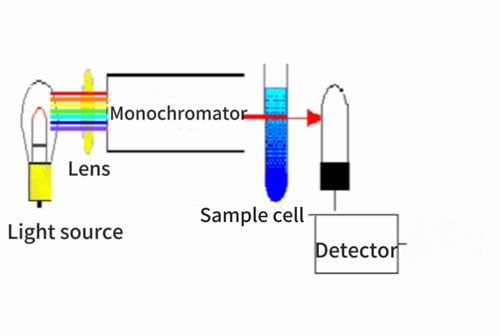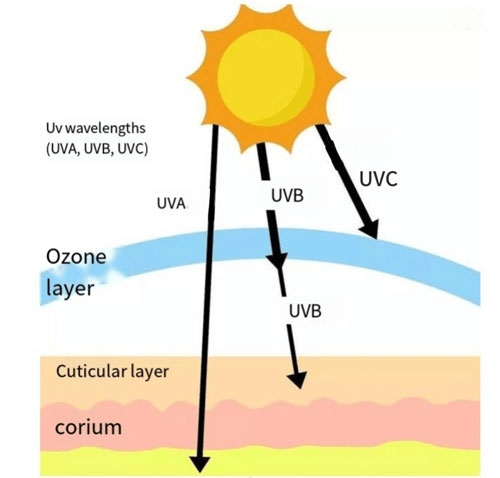Ultraviolet (UV) meters are important instruments used to measure the intensity of UV radiation. These devices play a vital role in a variety of fields including environmental monitoring, industrial processes, medical applications and scientific research. Understanding the uses of UV meters can help ensure safety, improve processes and enhance product quality. In this blog, we will explore the different applications of UV meters and their significance in everyday life.
Working Principle of the Ultraviolet Meter
The working principle of the ultraviolet meter is based on the law of light absorption. It uses a light source to emit light, passes through slits and filters, then through the sample pool, and finally to the photomultiplier tube. When light passes through the sample, the concentration of the sample will cause a change in the light intensity, which is detected by the photomultiplier tube and converted into a photocurrent, the size of the photocurrent is proportional to the concentration of the sample. By measuring the change in photocurrent, the concentration of the sample can be calculated.

The basic composition of the ultraviolet meter includes five parts: light source, monochromator, absorption cell, detector and signal detection system. The light source provides a stable continuous spectrum of sufficient intensity; The monochromator decomposes the complex light emitted by the light source and separates the monochromatic light of the required wavelength. The absorption tank is used to hold the sample to be tested; The detector detects the intensity of the light through the photoelectric conversion element, and converts the light signal into an electrical signal; The signal detection system processes the electrical signal and finally obtains the concentration information of the sample. These components of the UV meter work together to ensure its effective application in various fields.
Understanding UV Radiation
Before diving into the applications of UV meters, it’s important to understand what UV radiation is. UV radiation is a type of electromagnetic radiation with wavelengths shorter than visible light but longer than X-rays, typically ranging from 10 nm to 400 nm. It is divided into three categories based on wavelength.
1. UVA (320-400 nm): This type of UV radiation is the least harmful and is commonly associated with skin aging and tanning.
2. UVB (280-320 nm): UVB radiation can cause sunburn and is linked to skin cancer.
3. UVC (100-280 nm): UVC radiation is the most harmful but is mostly absorbed by the Earth's atmosphere and does not reach the surface.

Given the potential health risks associated with UV exposure, accurate measurement of UV radiation is essential.
Applications of UV Meters
Environmental Monitoring
Ultraviolet meters are widely used to monitor the ultraviolet Index, which shows the intensity of ultraviolet radiation from the sun. This information is essential for public health advice and helps individuals take precautions to avoid excessive exposure to UV radiation. By measuring UV radiation levels, authorities can issue timely warnings to the public, especially during the most intense hours of sunlight. Environmental scientists can also use UV meters to study the effects of UV radiation on ecosystems, including plant growth and aquatic life.
Medical Application
In the medical field, UV meters are essential to ensure the safety and effectiveness of UV treatments and therapies. For example, ultraviolet meters can be used to measure the intensity of ultraviolet light in phototherapy for skin conditions such as psoriasis and eczema. At the same time, hospitals and clinics also use UV meters to verify the effectiveness of UV disinfection systems to ensure that surfaces and air are adequately disinfected.
Industrial Process
Many industries rely on UV detectors for a variety of processes involving UV radiation. In the printing and coatings industry, UV meters measure the UV light intensity used to cure inks and coatings, ensuring the best curing results and product quality. Manufacturers use UV light meters to ensure that UV-sensitive materials are handled correctly, prevent defects and ensure the service life of the product.

Water and Air Purification
Ultraviolet meters are crucial in water and air purification, and ultraviolet light can be used to eliminate microorganisms and contaminants. In the water treatment industry, UV meters are used to ensure the effectiveness of UV disinfection systems. By measuring the intensity of UV light, these meters help maintain the safety and quality of drinking water. In the air purification system, the ultraviolet detector measures the intensity of ultraviolet light to kill pathogens in the air, ensuring that the indoor air is clean and safe.
Cosmetics and Personal Care
In the cosmetics industry, UV meters are used to test the efficacy of UV protection products to ensure that they provide adequate sun protection.
Uv meters measure the SPF (sun protection factor) of sunscreens and help consumers choose effective products.
Product development: Manufacturers use UV meters to assess the stability of UV-active ingredients in cosmetic formulations for product development.
Agriculture
In agricultural Settings, UV meters monitor UV environments, which can affect plant growth and the effectiveness of pest control methods. Farmers use UV meters to assess UV radiation levels in greenhouses and optimize plant growth conditions. UV meters also help to evaluate the effectiveness of UV-based pest control strategies.
Research and Development
In research and development, UV measuring instruments are used to explore new applications of UV technology and improve existing processes. Researchers use UV meters to study the effects of UV radiation on materials and biological systems, driving advances in technology and safety.
UV meters are versatile tools with a wide range of applications across various industries and scientific fields. Their ability to accurately measure UV radiation is essential for safety, research, process control, and compliance with regulations. Understanding the uses of UV meters and investing in high-quality instruments are crucial steps for anyone working with UV radiation. SISCO provides you with high-quality UV meters and different kinds of test and measurement devices. You can visit SISCO online mall for more information and professional consultation.

